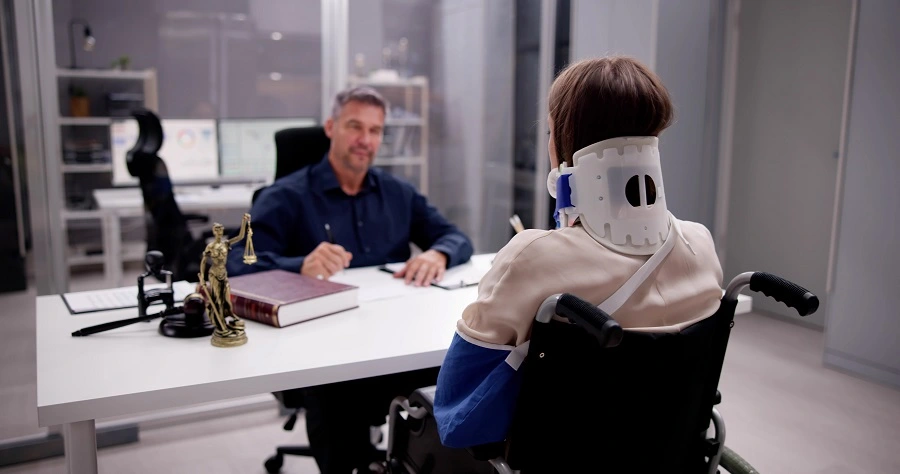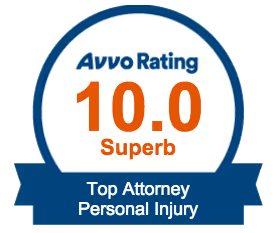Can You Get Workers' Compensation in Houston? What You Need to Know.

If you've been hurt on the job in Houston, you're likely entitled to workers' compensation benefits. Most Texas employers carry workers' compensation insurance, which covers medical bills and a portion of lost wages for employees hurt on the job. However, it’s not uncommon to face roadblocks on the way to getting your benefits.
Workers’ compensation is a no-fault system. In other words, you can receive benefits regardless of who was at fault for the accident.
To be eligible, you must have been injured in the course of your employment. Therefore, accidents that occur while you are at your workplace or while you are performing work-related tasks off-site should be covered.
It's important to note that independent contractors are not usually eligible for workers’ compensation benefits. Additionally, certain industries and small employers may have different rules and regulations. If you’re unsure whether your injury is covered, consult with an experienced Houston workers' compensation lawyer at Turnbull Legal Group.
What Kind of Workplace Accidents Qualify for Workers' Comp in Houston?

Most work-related injuries are covered, including these common examples.
Car Accidents
Workers' comp covers injuries that occur while you are driving for work-related purposes. For example, if you are in a collision during normal work hours while driving to meet a client or running an errand for your employer, your medical care should be covered. However, a car accident during your normal commute is not usually considered work-related.
Truck Accidents
With the hundreds of hours they spend on Texas roads, commercial truck and delivery drivers face unique risks. If you're injured in a trucking accident while on the job, you may be eligible for workers' compensation.
Slip and Fall Accidents
These accidents are frequent in workplaces, particularly in industries that involve wet floors, uneven surfaces, or obstacles.
Defective Product Injuries
If you were injured by a defective product or malfunctioning equipment while at work, you could pursue a workers' comp claim as well as a potential product liability lawsuit.
Pedestrian Accidents
Workers who are required to walk near motor vehicle traffic are vulnerable to injuries that qualify for workers' compensation.
Construction Accidents
Construction sites present numerous hazards for workers, often resulting in serious injuries. Workers' comp can help cover medical expenses and lost wages after a construction-related accident.
Wrongful Death
If a loved one died due to a work-related accident or illness in Houston, workers' comp death benefits may be available to support surviving family members.
What Injuries Are Covered by Workers’ Comp Benefits?
Most on-the-job injuries are covered by workers’ compensation in Texas, regardless of who was at fault. These are some of the most common work-related injuries we see in Houston:
- Back Injuries
Strains, herniated discs, and other painful back injuries are extremely common across all industries. - Neck Injuries
Strains, repetitive motions, or sudden impacts can cause neck pain, stiffness, and headaches. - Head Injuries
Falls, being struck by objects, or motor vehicle accidents on the job can lead to minor concussions or severe traumatic brain injuries. - Repetitive Motion Injuries
Carpal tunnel syndrome, tendinitis, and other repetitive stress injuries are common in jobs that involve repeated hand movements. - Slip, Trip, and Fall Injuries
Employees in a range of environments can experience sprains, fractures, and back problems after falling at work. - Burns
Construction workers, restaurant employees, and those working with hazardous materials are at increased risk of chemical, electrical, friction, or heat burns. - Occupational Illnesses
Employees who develop cancer and other diseases due to hazardous workplace conditions can be eligible for workers’ compensation.
No matter how minor or how serious the incident, the workers’ compensation system should cover your medical care if you were injured on the job.
Types of Workers' Comp Benefits Available in Texas
Texas workers' compensation insurance provides benefits to help you get back on your feet or maintain a reasonable standard of living if you are no longer able to work. These benefits may include:
- Medical Care
Necessary medical treatment related to your work injury, such as doctor visits, hospital stays, surgeries, medications, physical therapy, and rehabilitation. - Lost Income
A percentage of your previous average weekly wage, up to statewide limits. - Supplemental Income
Benefits to partially bridge the gap between your pre-injury and post-injury wages if you can only return to work in a lower-paying job. - Impairment Income
Benefits for a permanent impairment, such as loss of function in a body part. - Lifetime Income
Lifetime income replacement if your injury is so severe that you can no longer work at all. - Death Benefits
Money to help family members cover funeral expenses and provide ongoing financial support if they have lost a loved one to a work-related accident.
Larger claims, such as those for a lifetime impairment, may be paid in a lump-sum workers’ compensation settlement instead of weekly.
Houston Workplace Injury? Take Action to Protect Your Rights.

If you fail to take the right steps after a workplace injury, you could lose your right to receive medical care and lost wages. Here's what you should do:
- Report the Injury
Notify your supervisor or employer about your injury as soon as possible and request a written copy of the injury report after it has been completed. - Seek Medical Attention
Even if you think your injuries are minor, seek prompt medical attention from a doctor in the insurance provider’s network. - File a Workers' Compensation Claim
You have a limited time to file a claim with the Division of Workers’ Compensation (DWC) in the Texas Department of Insurance. - Gather Evidence
If possible, take photos or videos of the accident scene, get the contact information of any witnesses, and keep copies of all medical bills, receipts for expenses, and pay stubs. - Keep Your Employer Informed
Continue to update your employer about your medical treatment and recovery progress. - Consult an Attorney
Your employer's insurance company might ask you to sign documents that could impact your rights, but don’t sign anything until you've spoken with a workers' compensation lawyer.
Contact us today for a free consultation to discuss your situation and get started on the right path.
Workers' Compensation vs. Personal Injury Claim in Houston: What's the Difference?
While workers' compensation is often the primary path to compensation for workplace injuries in Houston, some injured workers have the right to file a personal injury claim. Here are a few differences between the two options:
Workers' Compensation Claim
Workers’ compensation is a no-fault system. This means that your medical bills will be covered even if your own mistake led to the accident. But in return, you cannot sue your employer if the company made a mistake that led to your injury.
When you file a claim, the workers’ compensation insurer should cover all of your injury-related medical bills and a portion of your lost wages. However, you cannot recover damages like pain and suffering.
Personal Injury Claim
To succeed in a personal injury lawsuit, you must prove that someone's negligence caused your injury. This can be a more complicated path to compensation, but you have the potential to win additional damages, such as pain, suffering, and full lost wages.
When to File a Personal Injury Claim After a Houston Work Injury

It's crucial to consult with an experienced Houston attorney to determine whether you have a valid personal injury case in addition to, or instead of, a workers' compensation claim. These are a few situations where a personal injury claim might be a viable option.
Employer Gross Negligence or Intentional Acts
While rare, you may be able to sue your employer directly in Texas if an intentional act led to your injuries. For example, this exception might apply if you were physically assaulted by the owner of the company.
Gross negligence is another exception. If someone dies as a result of their employer’s gross negligence, their family may have standing to sue the employer in Texas.
Lack of Workers’ Compensation Insurance
Most Houston companies choose to participate in the workers’ compensation system. But unlike in other states, Texas does not require private employers to purchase workers’ compensation insurance.
If your employer did not participate in workers’ comp, you can file a personal injury lawsuit to seek compensation for your medical bills and lost wages.
Third-Party Negligence
If someone other than your employer contributes to your injury due to negligence, you might have a separate claim against them. You can file a third-party claim against that negligent person or business in addition to a workers’ compensation claim.
For example, imagine that a delivery driver is injured in a crash caused by a drunk driver. The delivery driver can file a workers’ compensation claim with their employer’s insurer and a separate claim against the driver who caused the crash
What to Expect at Your Workers' Compensation IME in Houston

When you file a workers' compensation claim in Houston, you may be required to undergo an independent medical examination (IME). This examination is conducted by a doctor chosen by the DWC at the request of the workers’ compensation insurance company. The doctor’s goal is to evaluate your injuries and determine how they affect your ability to work.
This doctor is considered a neutral third party. However, they are not guaranteed to be free of bias. Because the findings of an IME can significantly influence the benefits you receive, being prepared is essential.
An attorney can help you prepare for the exam, protect your rights throughout the process, and advocate for your best interests if there are disputes or disagreements with the IME findings.
Here's what you can typically expect during a workers' compensation IME:
Review of Medical History
The doctor will likely begin by reviewing your medical records and asking about your injury, previous treatments, preexisting conditions, and current symptoms.
Physical Examination
You'll undergo a physical exam focused on the injured area. The doctor will assess your range of motion, strength, flexibility, and reflexes. Be prepared to perform basic movements and answer questions about your pain levels and limitations.
Functional Assessment
The IME may involve functional tests, such as lifting, bending, or reaching, to evaluate how well you can perform everyday tasks and work-related activities. The doctor may ask specific questions related to your job duties to understand the impact of your injury.
Record Review and Reporting
Following the examination, the doctor will prepare a report summarizing their findings, including their diagnosis, opinion on your ability to work, and recommendations for future treatment. This report is sent to the insurance company and may be used to determine whether to continue, modify, or deny your workers' compensation benefits.
Houston Workers' Compensation Appeals: Protecting Your Rights

When you face setbacks in your workers’ compensation claim, you have options. These are some common problems that injured workers face:
- Denied Claims
Reasons for denials include late reporting, insufficient evidence of a work-related injury, or preexisting conditions. - Disputed Benefits
Even if your claim is approved, the amount or type of benefits awarded may be in dispute. - Disputes over Medical Treatment
Disagreements about doctor selection, treatment plans, or the need for specific procedures are common.
A Houston workers’ compensation attorney can help you develop a plan after you experience a setback. Resolving a workers’ compensation dispute in Texas involves the following steps:
- Speak to the Insurance Company
You or your attorney can attempt to resolve the problem directly before requesting a benefit review conference (BRC). - Attend the BRC
The DWC can schedule an informal meeting where you, the insurance carrier, and a DWC officer will attempt to reach a resolution. - Attend a Contested Case Hearing
If a resolution isn’t reached at the BRC, you can request a formal hearing before a judge where both sides present evidence and legal arguments. - Appeal to Higher Courts
If you disagree with the judge’s decision, you can appeal to the DWC's Appeals Panel.
Further appeals might be possible through the Texas court system.
Factors That Can Impact Your Houston Workers’ Compensation Claim

The amount of workers' compensation benefits you may receive in Houston depends on several key factors:
- The Severity of Your Injuries
More serious injuries typically result in higher benefit amounts. - Your Ability to Return to Your Previous Job
If you can return to work with no restrictions, your benefits will likely be limited to medical expenses. - Your Previous Average Weekly Wage
Your income benefits are calculated based on your earnings before your injury. - Your Work Limitations
If you can only perform lighter work or if your working hours are restricted, you may be eligible for supplemental income benefits. - The Availability of Modified Duty
If your employer offers modified work within your limitations, you will be expected to continue to work in that capacity. - Preexisting Conditions
If your current work injury exacerbates a preexisting condition, it could affect the overall benefit amount. - Disputes with the Insurance Company
Disagreements about the cause of your injury, the extent of your disability, or the need for specific medical treatments can all potentially reduce your benefits.
We believe that every Texan should receive what they are due after an on-the-job injury. Our workers’ compensation attorney can evaluate your benefits and pursue the full amount of lost wages you deserve.
Get Back on Your Feet After a Workplace Injury
A workplace injury shouldn't define your future. Contact Turnbull Legal Group today for help with your workplace injury claim.
Get the Legal Help You Deserve: No Fees Unless You Recover Compensation
You pay us nothing unless we secure compensation for you. Contact us today for a free case evaluation.



















